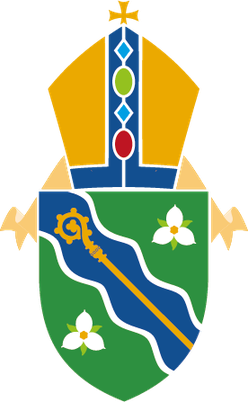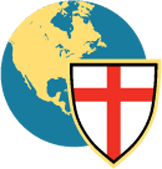Related Research Articles

The Anglican Communion is the third largest Christian communion after the Roman Catholic and Eastern Orthodox churches. Founded in 1867 in London, the communion has more than 85 million members within the Church of England and other autocephalous national and regional churches in full communion. The traditional origins of Anglican doctrine are summarised in the Thirty-nine Articles (1571). The archbishop of Canterbury in England acts as a focus of unity, recognised as primus inter pares, but does not exercise authority in Anglican provinces outside of the Church of England. Most, but not all, member churches of the communion are the historic national or regional Anglican churches.
Anglicanism is a Western Christian tradition which developed from the practices, liturgy, and identity of the Church of England following the English Reformation, in the context of the Protestant Reformation in Europe. It is one of the largest branches of Christianity, with around 110 million adherents worldwide as of 2001.

The Church of Nigeria is the Anglican church in Nigeria. It is the second-largest province in the Anglican Communion, as measured by baptised membership, after the Church of England. In 2016 it stated that its membership was “over 18 million", out of a total Nigerian population of 190 million. It is "effectively the largest province in the Communion." As measured by active membership, the Church of Nigeria has nearly 2 million active baptised members. According to a study published by Cambridge University Press in the Journal of Anglican Studies, there are between 4.94 and 11.74 million Anglicans in Nigeria. The Church of Nigeria is the largest Anglican province on the continent of Africa, accounting for 41.7% of Anglicans in Sub-Saharan Africa, and is "probably the first [largest within the Anglican Communion] in terms of active members."
The term high church refers to beliefs and practices of Christian ecclesiology, liturgy, and theology that emphasize "ritual, priestly authority, [and] sacraments". Although used in connection with various Christian traditions, the term originated in and has been principally associated with the Anglican tradition, where it describes churches using a number of ritual practices associated in the popular mind with Roman Catholicism and Eastern Orthodoxy. The opposite tradition is low church. Contemporary media discussing Anglican churches often prefer the terms evangelical to low church and Anglo-Catholic to high church, even though their meanings do not exactly correspond. Other contemporary denominations that contain high church wings include some Lutheran, Presbyterian, and Methodist churches.

The Anglican Church of Canada is the province of the Anglican Communion in Canada. The official French-language name is l'Église anglicane du Canada. In 2017, the Anglican Church counted 359,030 members on parish rolls in 2,206 congregations, organized into 1,571 parishes. The 2021 Canadian census counted 1,134,315 self-identified Anglicans, making the Anglican Church the third-largest Canadian church after the Catholic Church and the United Church of Canada. The 2021 Canadian census counted more than 1 million self-identified Anglicans, remaining the third-largest Canadian church.
In 2003, the Lambeth Commission on Communion was appointed by the Anglican Communion to study problems stemming from the consecration of Gene Robinson, the first noncelibate self-identifying gay priest to be ordained as an Anglican bishop, in the Episcopal Church in the United States and the blessing of same-sex unions in the Anglican Diocese of New Westminster. The Commission, chaired by Archbishop Robin Eames, published its findings as the Windsor Report on 18 October 2004. The report recommended a covenant for the Anglican Communion, an idea that did not come to fruition.

The Diocese of Niagara is one of thirty regional divisions in the Anglican Church of Canada. The see city of the diocese is Hamilton, with the bishop's cathedra located at Christ's Church Cathedral on James Street North. Located within the ecclesiastical province of Ontario, it borders the Dioceses of Huron and Toronto. The area enclosed by the Diocese of Niagara includes much of the Golden Horseshoe, and moves north to include Erin and Orangeville as far as Shelburne. Moving sharply south, the boundary includes Mount Forest and widens, south-westerly to include Elora and Guelph. Skirting Brantford and the Territory of the Six Nations Confederacy, the line then travels, again, south-westerly to Jarvis and Lake Erie to include the entire Niagara Peninsula. Major urban centres within its borders are St. Catharines, Niagara Falls, Hamilton, Guelph, Oakville, Milton, Burlington, and Orangeville.

The Anglican Network in Canada (ANiC) is a group of Anglican churches in Canada and the United States established in 2005 under the jurisdiction of the Anglican Province of the Southern Cone, a province of the Anglican Communion. It was a founding diocese of the Anglican Church in North America in June 2009. It comprises over 70 congregations in nine Canadian provinces, Alberta, British Columbia, Saskatchewan, Manitoba, New Brunswick, Newfoundland & Labrador, Nova Scotia, Ontario, Quebec, and two American states, Massachusetts and Vermont. Their first Moderator Bishop was Don Harvey, from 2009 to 2014, when he was succeeded by Diocesan Bishop Charlie Masters. Bishop Dan Gifford became Diocesan Bishop in 2022.
The Ecclesiastical Province of Canada, founded in 1860, forms one of four ecclesiastical provinces in the Anglican Church of Canada. Despite modern use of the name Canada, the ecclesiastical province covers only the former territory of Lower Canada, the Maritimes, and Newfoundland and Labrador The province comprises seven dioceses:
The Ecclesiastical Province of British Columbia and Yukon is one of four ecclesiastical provinces in the Anglican Church of Canada. It was founded in 1914 as the Ecclesiastical Province of British Columbia, but changed its name in 1943 when the Diocese of Yukon was incorporated from the Ecclesiastical Province of Rupert's Land. The territory covered by the province encompasses the civil province of British Columbia and Yukon. There are five dioceses and one "recognized territory [with] the status of a diocese" in the province:

The Anglican Church of South America is the ecclesiastical province of the Anglican Communion that covers six dioceses in the countries of Argentina, Bolivia, Paraguay, Peru, and Uruguay.
The Anglican realignment is a movement among some Anglicans to align themselves under new or alternative oversight within or outside the Anglican Communion. This movement is primarily active in parts of the Episcopal Church in the United States and the Anglican Church of Canada. Two of the major events that contributed to the movement were the 2002 decision of the Diocese of New Westminster in Canada to authorise a rite of blessing for same-sex unions, and the nomination of two openly gay priests in 2003 to become bishops. Jeffrey John, an openly gay priest with a long-time partner, was appointed to be the next Bishop of Reading in the Church of England and the General Convention of the Episcopal Church ratified the election of Gene Robinson, an openly gay non-celibate man, as Bishop of New Hampshire. Jeffrey John ultimately declined the appointment due to pressure.
The Diocese of Keewatin was a diocese of the Anglican Church of Canada. As of 1 August 2014, it no longer had any territorial jurisdiction, but it continued to exist as a legal entity until 30 September 2015, when it was formally closed.

The Anglican Church in North America (ACNA) is a Christian denomination in the Anglican tradition in the United States and Canada. It also includes ten congregations in Mexico, two mission churches in Guatemala, and a missionary diocese in Cuba. Headquartered in Ambridge, Pennsylvania, the church reported 977 congregations and 124,999 members in 2022. The first archbishop of the ACNA was Robert Duncan, who was succeeded by Foley Beach in 2014.
The following is a list of Anglican churches in the Americas.
A personal ordinariate for former Anglicans, shortened as personal ordinariate or Anglican ordinariate, is an ordinariate, a canonical structure within the Catholic Church established in order to enable "groups of Anglicans" and Methodists to join the Catholic Church while preserving elements of their liturgical and spiritual patrimony.

The Personal Ordinariate of the Chair of Saint Peter is a Latin Church ecclesiastical jurisdiction or personal ordinariate of the Catholic Church for Anglican converts in the United States and Canada. It allows these parishioners to maintain elements of Anglican liturgy and tradition in their services. The ordinariate was established by the Vatican in 2012.

The 1962 Book of Common Prayer is an authorized liturgical book of the Canada-based Anglican Church of Canada. The 1962 prayer book is often also considered the 1959 prayer book, in reference to the year the revision was first approved for an "indefinite period" of use beginning in 1960. The 1962 edition follows from the same tradition of other versions of the Book of Common Prayer used by the churches within the Anglican Communion and Anglicanism generally. It contains both the Eucharistic liturgy and Daily Office, as well as additional public liturgies and personal devotions. The second major revision of the Book of Common Prayer of the Anglican Church of Canada, the 1962 Book of Common Prayer succeeded the 1918 edition, which itself had replaced the Church of England's 1662 prayer book. While supplanted by the 1985 Book of Alternative Services as the Anglican Church of Canada's primary Sunday service book, the 1962 prayer book continues to see usage.
References
- ↑ DeSantis, Solange (February 1, 2006). "Think Tank Ends Its 10-Year Run". Anglican Journal. Retrieved April 2, 2022.